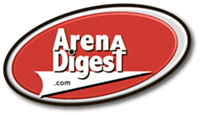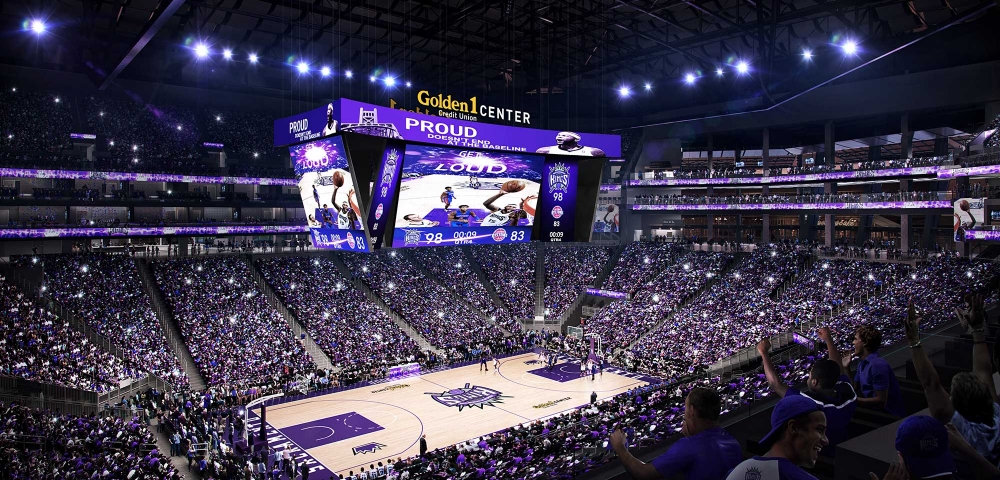Big milestone for the Sacramento Kings: Golden 1 Center is the first indoor sports arena to be certified as LEED Platinum by the United States Green Building Council (USGBC).
LEED Platinum is the highest level of certification possible from the USGBC, and reaching that level was a goal of the Kings and arena architect AECOM from the beginning. To achieve it, projects must earn more than 80 points on a scale that evaluates energy management, water efficiency, environmental quality, transportation, materials utilized and more. Golden 1 Center earned enough points to receive platinum designation – placing it in the top 3 percent of all buildings certified and the highest total for any sports facility in the world, according to the team.
“Our hope in creating Golden 1 Center was to help drive meaningful change in our community – which includes working to curb climate change and promote renewable energy,” said Kings Owner and Chairman Vivek Ranadivé. “Businesses, including large sports franchises, have a core responsibility to help facilitate the world’s clean energy transition so that we can better protect the health and environment of future generations. The 1.2 million people who will pass through our doors each year will see first hand how adopting the best sustainability practices can improve the fan experience.”
The arena will be the first in the world to combine the use of displacement ventilation – a reduced-energy cooling system utilizing passive climate controlled air – and crowd-sourced feedback to maximize fan comfort. Five massive hangar doors above the grand entrance will open and allow the arena to use natural cooling phenomenon in Sacramento – The Delta Breeze – to control the building’s climate efficiently. With over 300 days of sunshine in Sacramento, the arena’s urban-smart energy system – with a specially designed 1.2 megawatt solar array on the arena roof and an 11 megawatt solar farm 40 miles away through a SMUD partnership – provides a creative solution for generating the power for the venue’s over 200 events all year long.
A thirteen-month environmental impact analysis of Golden 1 Center’s site found the Sacramento Kings decision to move the arena downtown will reduce average miles traveled per attendee by 20 percent, cut overall air emissions by 24 percent, and reduce travel-related greenhouse gas emissions per attendee by 36 percent by 2020. In total, the Sacramento Kings’ architectural choices are estimated to keep nearly 2,000 tons of greenhouse gas emissions annually out of the atmosphere – equivalent to emissions from approximately 4 million vehicle miles.
“We worked with the Kings to design Golden 1 Center for fans, city and planet,” said Bill Hanway, AECOM’s global sports leader. “Our architects, sports designers, sustainability experts, engineers, urban planners and landscape architects worked together from the beginning to shape an indoor-outdoor arena that is revitalizing downtown Sacramento and setting a new global standard for sustainability.”
“California has more green buildings than any other state in the nation and Sacramento’s new arena is an example of the elegant design and construction we need to meet our ambitious climate goals,” said California Governor Jerry Brown.
In the past year, the Sacramento Kings have announced a series of commitments to sustainability, including a “Farm-to-Court” plan to source ninety percent of Golden 1 Center’s concessions from local businesses and farms within 150 miles of the arena, recycling athletic shoes to create a new resilient court, and partnering with industry leaders like the Green Sports Alliance. They are also working with leaders in food sustainability like California-based Sierra Nevada brewery to provide locally brewed beer and create a green education curriculum for local students.
Other key sustainability statistics for Golden 1 Center include:
- First professional sports venue to be completely powered by solar energy
- Water conservation resulting in a 45 percent reduction in use over stringent California code
- 30 percent reduction in energy use over the stringent California Title 24 code requirements
- 2,000 fewer tons of annual carbon emissions
- 99 percent of demolition materials recycled
- 95 percent of construction waste diverted
- 36 percent of construction materials from recycled sources
- 30 percent of construction materials from regional sources
- 90 percent of food and beverage concessions sourced from within 150 miles
- First venue to crowd source feedback to maximize fan comfort and reduce energy consumption.
Rendering courtesy of the Sacramento Kings.
RELATED STORIES: Sacramento’s Golden Opportunity


